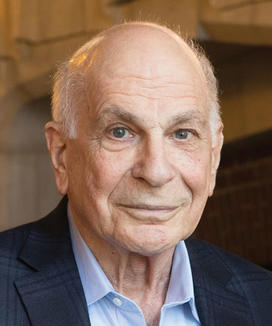In Memoriam

Daniel Kahneman, a psychologist whose insightful research on human behavior earned him a share of the 2002 Nobel Prize in economic sciences, died March 27 at age 90. Kahneman famously never took an economics course, but his work on topics such as decision-making and loss aversion made a lasting mark on how economists view the world. He also taught hundreds of budding social scientists in Princeton’s Introduction to Psychology course (aka Psych 101). After 14 years on the faculty, he transferred to emeritus status in 2007 and published Thinking, Fast and Slow (2011), a bestselling book that shared his research with a broad audience. Kahneman and his longtime collaborator Amos Tversky were the subjects of another bestseller, The Undoing Project (2016), by Michael Lewis ’82. Princeton’s Kahneman-Treisman Center for Behavioral Science and Public Policy was created in honor of Kahneman and his wife, fellow psychology professor Anne Treisman, who died in 2018.









1 Response
Yuchen Zhang ’10
1 Year AgoRemembering Danny Kahneman
The thing about Professor Danny Kahneman, who died March 27 at age 90, that was most remarkable to me (aside from his genius), was his wise honesty. I remember distinctly our first encounter outside of class (he taught a last course on behavioral economics after he had retired to test out material for his bestseller Thinking, Fast and Slow), where I had invited him to lunch at one of the eating clubs and one of the first things he remarked was “It’s very loud in here.” He also always told me to remind him about meetings multiple times because “I am very forgetful.”
Years later, when I opened an organic smoothie cafe in Santa Monica, California, I asked Danny if he thought we should end our prices in .99, .95, or .00, and he said he preferred round numbers, “which strike me as more honest and straightforward. As I think about it, I associate round dollar prices with an image of quality, and the 99 cents with the idea that the customers are poor and worry about every cent.”
Nevertheless, he still was the first person to buy my 99-cent family comedy ebook — in support of course, even though it wasn’t quite up to the standard of a round-dollar-quality book.
At Princeton, I had wanted to bring an actor or actress to campus to promote an environmental cause and he recommended that I focus on something concrete instead. “Very little happens without specific involvement,” he said.
Years later, when we discussed people choosing careers like becoming actors and actresses, he told me that to be happy in life, one should probably not pursue these careers, as the likelihood of success and happiness is abysmally low. When I asked him if he gave that advice to his children, he said no, he only gave advice when asked, and that included his children.
When I asked him if a natural telehealth service sounded like a good startup idea, he told me that anything involving a live doctor didn’t sound like a very scalable technology idea. He also didn’t like the idea of tele-anything, especially when I told him I worked remote. He just shook his head and thought it strange and not something that he thought could succeed in academia.
The last time we met, I remember being quite afraid of COVID, and Danny, 88 at the time, was absolutely not. Still living by himself in Manhattan, I asked him how he stayed strong, and he told me he likes his exercise bike. I asked him if he was afraid of the cold, and he said he was more afraid of the heat, as he was about to go on a safari in Africa.
If there’s one thing I’ll remember about Danny, it’s that he was not afraid of honesty and the truth, and frankly, it was in these moments of truth that I gained the most wisdom from him. So thank you, Danny, for your honesty, your wisdom, and your friendship. May you forever rest in peace.